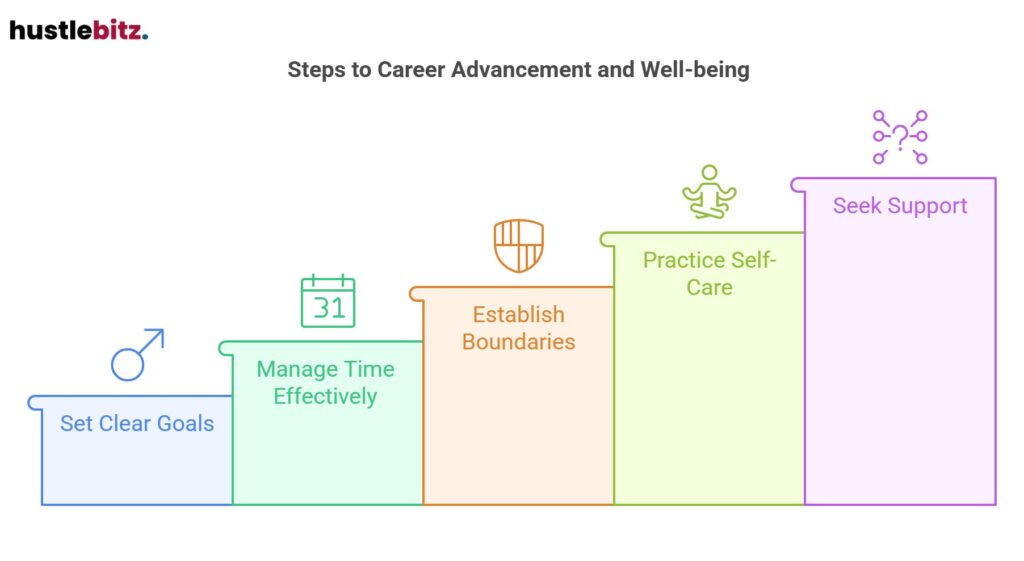Achieving work-life balance is crucial for personal well-being and career success. It involves setting clear boundaries between professional and personal life to prevent stress and burnout. Effective strategies include time management, prioritizing self-care, and embracing flexibility. Regular engagement in hobbies and community service adds fulfillment, while mindfulness practices enhance resilience. Aligning career goals with a healthy lifestyle fosters productivity and job satisfaction. By recognizing the signs of burnout and seeking support from colleagues, individuals can strategize for long-term achievements. Exploring these strategies further can provide you with valuable insights on maintaining this balance effectively.
Key Takeaways
- Set clear, achievable goals that align with both your personal values and professional aspirations for focused career advancement.
- Implement effective time management strategies, such as calendars and task lists, to prioritize work and personal commitments.
- Establish and communicate boundaries to protect personal time, preventing burnout and enhancing work satisfaction.
- Incorporate self-care practices like exercise and mindfulness into your routine to recharge and maintain productivity.
- Seek support from colleagues and mentors to foster a sense of community and share experiences for better resilience.

Understanding Work-Life Balance
Understanding work-life balance is essential for fostering both personal well-being and professional productivity, as it enables individuals to effectively manage their time and commitments across various aspects of their lives.
The importance of work-life balance cannot be overstated; it serves as a foundation for sustaining motivation and energy in both professional and personal life. When individuals prioritize this balance, they cultivate a more harmonious existence, allowing them to serve others more effectively.
Achieving a healthy work-life balance requires intentional effort and strategic planning. Setting boundaries is a crucial step in this journey. By delineating the time allocated to work and personal pursuits, individuals can prevent the encroachment of professional obligations into their personal time, which often leads to stress and burnout. For instance, establishing clear limits on after-hours work communications can enhance focus and presence in both spheres.
Moreover, adopting practices that promote well-being—such as regular physical activity, mindfulness, and quality time with loved ones—can significantly contribute to achieving work-life balance. These practices not only enhance personal fulfillment but also improve overall job performance and satisfaction.
Work-Life Balance: Essential for Long-Term Career Success

Achieving a sustainable work-life balance is crucial not only for immediate well-being but also for fostering long-term career success and resilience in a competitive job market. Individuals who prioritize a healthy work-life balance are more likely to align their daily activities with their career goals, ultimately leading to enhanced job satisfaction and professional fulfillment.
Maintaining a healthy work-life balance allows professionals to recharge their mental and emotional resources, which significantly impacts their productivity. When employees are not overwhelmed by stress or burnout, they can engage more fully with their work and make meaningful contributions. This heightened productivity not only benefits the individual but also the organization as a whole, fostering a culture of collaboration and innovation.
Moreover, achieving a work-life balance enhances overall well-being. Individuals who invest time in personal development, family, and community engagement are better equipped to handle the pressures of their professional lives. This holistic approach to life creates a virtuous cycle where personal fulfillment feeds back into professional success.
In an era where the boundaries between personal and professional lives are increasingly blurred, recognizing the importance of work-life balance is vital. It serves as a foundation for sustainable growth, enabling individuals to navigate challenges while remaining committed to their career aspirations. By embracing this balance, professionals can cultivate resilience, allowing them to not only achieve their career goals but also contribute positively to the lives of others around them.
Effective Strategies to Balance Your Professional and Personal Life
Consistently implementing effective strategies can significantly enhance your ability to balance professional responsibilities with personal commitments. Achieving work-life balance is essential for fostering a fulfilling personal life, and it begins with establishing clear boundaries between work and personal time. Here are some key strategies to help improve work-life balance:
| Strategy | Description | Benefits |
| Time Management | Use tools like calendars and task lists to prioritize tasks and allocate time effectively. | Reduces stress, increases productivity. |
| Set Boundaries | Clearly communicate your availability to colleagues and family to protect personal time. | Prevents burnout, enhances relationships. |
| Prioritize Self-Care | Schedule regular breaks, exercise, and relaxation activities to recharge your energy. | Improves mental health, boosts creativity. |
| Embrace Flexibility | Adapt your work schedule to accommodate life’s demands, allowing for adjustments when necessary. | Increases satisfaction, promotes resilience. |
Align Your Career Goals with a Healthy Lifestyle

Aligning career goals with a healthy lifestyle is essential for sustaining long-term success and personal well-being. In today’s fast-paced world, achieving a work-life balance is not merely a luxury but a necessity, particularly for those who aspire to serve others. A fulfilling career should not come at the expense of personal health; rather, it should complement and enhance one’s lifestyle.
To effectively align your career aspirations with a healthy lifestyle, it is crucial to set clear, achievable goals that reflect both your personal and professional values. This means identifying what success looks like for you, and ensuring that your ambitions do not overshadow your health or relationships. By prioritizing your well-being, you lay a solid foundation for enduring achievements in your career.
Additionally, managing your time effectively is vital in this alignment. Establishing boundaries between work and personal life enables you to dedicate time to self-care, family, and community service. Incorporating regular breaks, physical activity, and mindfulness practices can significantly enhance productivity and creativity in your professional endeavors.
Ultimately, a healthy work-life balance fosters resilience, allowing you to face challenges with renewed energy and focus. Striving for this balance not only enriches your life but also empowers you to make a positive impact on others. By aligning your career goals with a healthy lifestyle, you embark on a journey that nurtures both your aspirations and your well-being.
Avoid Burnout While Pursuing Ambitious Career Goals

Maintaining a healthy work-life balance is vital to prevent burnout while pursuing ambitious career goals. As individuals who aspire to serve others, it becomes essential to recognize the signs of burnout and take proactive steps to mitigate its effects.
Here are four strategies to help you avoid burnout and improve your work-life balance:
- Set Clear Goals: Establish specific, measurable, achievable, relevant, and time-bound (SMART) goals that align with both your professional ambitions and personal values. This clarity will help you prioritize tasks effectively.
- Create Boundaries: Clearly define the boundaries between your work and personal life. Set specific work hours and stick to them, allowing yourself time to recharge and engage in activities that bring joy and fulfillment.
- Practice Self-Care: Incorporate regular self-care routines into your schedule, such as exercise, meditation, or hobbies. Taking time for yourself is essential to maintain energy levels and enthusiasm for your work.
- Seek Support: Don’t hesitate to reach out to colleagues, mentors, or friends for support. Sharing your challenges and experiences can provide valuable insights and foster a sense of community.
Building Resilience: Managing Stress in a Demanding Career

While the demands of a challenging career can often lead to heightened stress levels, developing resilience is essential for navigating these pressures effectively.
Building resilience enables professionals to adapt to challenges while maintaining a focus on their personal life and service to others. A resilient mindset fosters the ability to confront adversity with strength, ultimately enhancing both mental well-being and professional performance.
To effectively manage stress in a demanding career, it is crucial to establish clear boundaries between work and personal life. These boundaries create a structured environment that allows individuals to recharge, thereby reducing stress and promoting overall work-life balance.
Engaging in activities outside of work, such as hobbies or community service, can significantly contribute to personal fulfillment and a sense of purpose, which are vital in the face of occupational demands.
Moreover, practicing mindfulness and self-care techniques can enhance resilience. Mindfulness encourages individuals to stay present and grounded, reducing anxiety related to future uncertainties.
Simple practices, such as deep breathing exercises or reflective journaling, can provide immediate relief and foster a sense of control over one’s circumstances.
The Benefits of Setting Boundaries in the Workplace

Establishing boundaries in the workplace serves as a vital strategy for enhancing both individual well-being and overall productivity. In a world where the lines between work and personal life increasingly blur, it is essential to recognize that work-life balance means more than just managing time; it involves prioritizing one’s mental health and personal responsibilities.
By setting clear boundaries, individuals can effectively support work-life balance and improve their overall job satisfaction.
Here are some key benefits of establishing boundaries in the workplace:
- Improved Focus: By defining specific work hours and personal time, employees can concentrate better on their responsibilities at work, leading to higher quality outputs.
- Reduced Burnout: Disconnecting from work after hours allows individuals to recharge mentally and physically, helping to prevent burnout and maintain long-term productivity.
- Enhanced Relationships: Setting boundaries encourages healthier interactions with colleagues, fostering a supportive environment that values mutual respect and understanding.
- Increased Job Satisfaction: When employees feel empowered to prioritize personal time, they are more likely to experience job satisfaction and commitment to their work.
Final Thoughts
Achieving a harmonious balance between work and life is not just about managing time but about making intentional choices that align with your values and well-being. By setting clear boundaries, prioritizing self-care, and aligning your career goals with a healthy lifestyle, you can pursue your ambitions without sacrificing your personal happiness. Remember, true success lies in the ability to maintain resilience, stay connected with loved ones, and find fulfillment in both your professional and personal endeavors. Continuously reassess and adjust your strategies to ensure that you’re nurturing all aspects of your life, enabling you to thrive in all that you do.




